Correspondence: Letters to and from Thomas Merton
Item set
Items
-
 1962-02-17: Letter from Thomas Merton to Lewis Mumford This item is only viewable at the Thomas Merton Center.
1962-02-17: Letter from Thomas Merton to Lewis Mumford This item is only viewable at the Thomas Merton Center. -
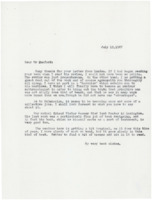 1967-07-12: Letter from Thomas Merton to Lewis Mumford
1967-07-12: Letter from Thomas Merton to Lewis Mumford -
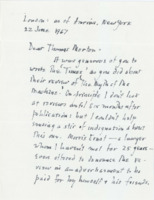 1967-06-22: Letter from Lewis Mumford to Thomas Merton
1967-06-22: Letter from Lewis Mumford to Thomas Merton -
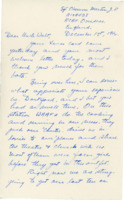 1942-12-01: Letter from John Paul Merton (Thomas Merton's younger brother) to his uncle by marriage, Walter S. Hauck John Paul Merton writes to his uncle while serving in England in the Royal Canadian Air Force during the Second World War. He speaks of his upcoming marriage in Birkenhead to Margaret Evans.John Paul Merton was Thomas Merton's younger, and only, sibling. The boys spent much time apart, Thomas traveling with his father Owen, the painter, in France and England, where he was schooled. John Paul lived with his maternal grandparents, the Jenkins, and went to schools in New York and later military academy, graduating in the last class in 1935 from Gettysburg, Pennsylvania's academy. He attended Cornell and was there first interested in Catholicism, taking up flying with the Catholic chaplain, Fr. Donald Cleary. He joined the Royal Canadian Air Force (RCAF) in 1941, intending to get involved in the Second World War and the United States was not yet committed. He went by the nickname "Mert". One of the correspondents in the letters in the Merton Collection, Thomas O'Brien, gave his flight training. John Paul visited Thomas Merton at Gethsemani during a leave in July of 1942. He expressed interest in becoming baptized Catholic and received expedited instructions from Thomas and Dom James Fox because he had only a week's leave. He was baptized July 26, 1942. In August 1942, John Paul was sent into action in England. While on leave in England, he met Margaret May Evans and married her in February of 1943. On April 16, 1943, he embarked in a Wellington bomber over the English Channel. For unknown reasons, the plane lost altitude and crashed. John Paul's back was broken, but he was taken aboard a dinghy with some survivors. He died the 17th, which was the Saturday of Passion Week. The others were rescued Holy Thursday, and Thomas Merton learned of his brother's death on Easter Tuesday. Thomas Merton responded with the poem, "For My Brother Reported Missing in Action, 1943", which concludes the The Seven Storey Mountain. (Source: The Thomas Merton Encyclopedia, pp. 294-295.)
1942-12-01: Letter from John Paul Merton (Thomas Merton's younger brother) to his uncle by marriage, Walter S. Hauck John Paul Merton writes to his uncle while serving in England in the Royal Canadian Air Force during the Second World War. He speaks of his upcoming marriage in Birkenhead to Margaret Evans.John Paul Merton was Thomas Merton's younger, and only, sibling. The boys spent much time apart, Thomas traveling with his father Owen, the painter, in France and England, where he was schooled. John Paul lived with his maternal grandparents, the Jenkins, and went to schools in New York and later military academy, graduating in the last class in 1935 from Gettysburg, Pennsylvania's academy. He attended Cornell and was there first interested in Catholicism, taking up flying with the Catholic chaplain, Fr. Donald Cleary. He joined the Royal Canadian Air Force (RCAF) in 1941, intending to get involved in the Second World War and the United States was not yet committed. He went by the nickname "Mert". One of the correspondents in the letters in the Merton Collection, Thomas O'Brien, gave his flight training. John Paul visited Thomas Merton at Gethsemani during a leave in July of 1942. He expressed interest in becoming baptized Catholic and received expedited instructions from Thomas and Dom James Fox because he had only a week's leave. He was baptized July 26, 1942. In August 1942, John Paul was sent into action in England. While on leave in England, he met Margaret May Evans and married her in February of 1943. On April 16, 1943, he embarked in a Wellington bomber over the English Channel. For unknown reasons, the plane lost altitude and crashed. John Paul's back was broken, but he was taken aboard a dinghy with some survivors. He died the 17th, which was the Saturday of Passion Week. The others were rescued Holy Thursday, and Thomas Merton learned of his brother's death on Easter Tuesday. Thomas Merton responded with the poem, "For My Brother Reported Missing in Action, 1943", which concludes the The Seven Storey Mountain. (Source: The Thomas Merton Encyclopedia, pp. 294-295.) -
 1964-08-21: Photograph of a mosaic by Jaime Andrade - photographic slide sent to Thomas Merton in a letter from Andrade dated August 21, 1964
1964-08-21: Photograph of a mosaic by Jaime Andrade - photographic slide sent to Thomas Merton in a letter from Andrade dated August 21, 1964 -
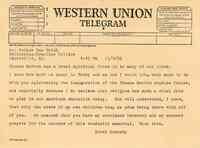 1969-11-04: Telegram from Ethel Kennedy to Fr. Dan Walsh Ethel Kennedy expresses her regrets that she will not be able to attend the inauguration of the Thomas Merton Studies Center at Bellarmine College in Louisville, Kentucky. She notes the importance of Merton for her and for her husband, the late Bobby Kennedy.
1969-11-04: Telegram from Ethel Kennedy to Fr. Dan Walsh Ethel Kennedy expresses her regrets that she will not be able to attend the inauguration of the Thomas Merton Studies Center at Bellarmine College in Louisville, Kentucky. She notes the importance of Merton for her and for her husband, the late Bobby Kennedy. -
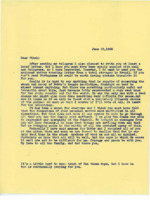 1968-06-22: Letter to Ethel Kennedy from Thomas Merton after the assassination of Robert Kennedy Thomas Merton offers Ethel Kennedy condolences following the assassination of her husband, Robert F. Kennedy. Merton encloses what he describes as a "rather touching letter from a total stranger in Brazil. Merton expresses shock regarding "Bobby's tragic immolation" and the hope for the country and for peace lost in his passing. Merton references their mutual friend, Fr. Dan Walsh.
1968-06-22: Letter to Ethel Kennedy from Thomas Merton after the assassination of Robert Kennedy Thomas Merton offers Ethel Kennedy condolences following the assassination of her husband, Robert F. Kennedy. Merton encloses what he describes as a "rather touching letter from a total stranger in Brazil. Merton expresses shock regarding "Bobby's tragic immolation" and the hope for the country and for peace lost in his passing. Merton references their mutual friend, Fr. Dan Walsh. -
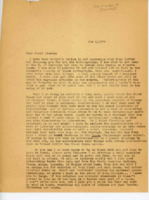 1968-01-04: Letter to David Friend Aberle from Thomas Merton W. H. "Ping" Ferry had asked David Aberle, an anthropologist, to write to Merton about the Sioux (Lakota) and about Sitting Bull. Though not an expert on the Lakota, Aberle offers some resources and advice. Merton responds that he is most interested in background on the Ghost Dance. David F. Aberle was a professor of anthropology at University of British Columbia whose specialty was the study of the Navajos.
1968-01-04: Letter to David Friend Aberle from Thomas Merton W. H. "Ping" Ferry had asked David Aberle, an anthropologist, to write to Merton about the Sioux (Lakota) and about Sitting Bull. Though not an expert on the Lakota, Aberle offers some resources and advice. Merton responds that he is most interested in background on the Ghost Dance. David F. Aberle was a professor of anthropology at University of British Columbia whose specialty was the study of the Navajos. -
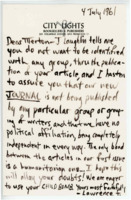 1961-07-04 : Correspondence with Lawrence Ferlinghetti, letter to Merton
1961-07-04 : Correspondence with Lawrence Ferlinghetti, letter to Merton -
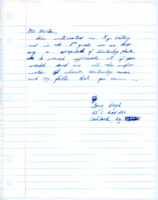 1967-03-00: Letter from Tony Boyd to Thomas Merton, circa March 1967 Tony Boyd was a seventh-grader writing from Ashland, Kentucky. He asked Merton for information about Kentucky music and facts. In Merton's reply, he expresses his appreciation for Kentucky, having spent half of his life in the state, and his fondness for country music and Johnny Cash (though Merton acknowledges that Cash is not from Kentucky). He writes also of Gethsemani Abbey, describing the buildings and their renovation, the Gregorian chant, and the work of the monks.
1967-03-00: Letter from Tony Boyd to Thomas Merton, circa March 1967 Tony Boyd was a seventh-grader writing from Ashland, Kentucky. He asked Merton for information about Kentucky music and facts. In Merton's reply, he expresses his appreciation for Kentucky, having spent half of his life in the state, and his fondness for country music and Johnny Cash (though Merton acknowledges that Cash is not from Kentucky). He writes also of Gethsemani Abbey, describing the buildings and their renovation, the Gregorian chant, and the work of the monks.
